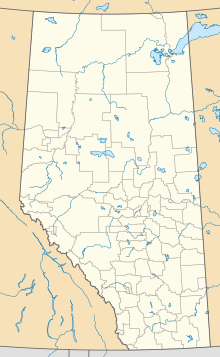Itaska Beach is a summer village in Alberta, Canada. It is located on the northwest shore of Pigeon Lake, west of Wetaskiwin.
Itaska Beach | |
|---|---|
| Summer Village of Itaska Beach | |
Location of Itaska Beach in Alberta | |
| Coordinates: 53°04′17″N 114°04′41″W / 53.07130°N 114.078°W | |
| Country | Canada |
| Province | Alberta |
| Region | Edmonton Metropolitan Region |
| Census division | No. 11 |
| Government | |
| • Type | Municipal incorporation |
| • Mayor | Rex Nielsen |
| • Governing body | Itaska Beach Summer Village Council |
| Area (2021)[2] | |
| • Land | 0.26 km2 (0.10 sq mi) |
| Population (2021)[2] | |
• Total | 30 |
| • Density | 113.4/km2 (294/sq mi) |
| Time zone | UTC−7 (MST) |
| • Summer (DST) | UTC−6 (MDT) |
| Website | Official website |
The name derives from ispâskweyâw (ᐃᐢᐹᐢᑫᐧᔮᐤ),[3] the Cree words for "high trees on the edge of woods".[4]
Demographics
editIn the 2021 Census of Population conducted by Statistics Canada, the Summer Village of Itaska Beach had a population of 30 living in 14 of its 73 total private dwellings, a change of 30.4% from its 2016 population of 23. With a land area of 0.26 km2 (0.10 sq mi), it had a population density of 115.4/km2 (298.8/sq mi) in 2021.[2]
In the 2016 Census of Population conducted by Statistics Canada, the Summer Village of Itaska Beach had a population of 23 living in 10 of its 78 total private dwellings, a 15% change from its 2011 population of 20. With a land area of 0.29 km2 (0.11 sq mi), it had a population density of 79.3/km2 (205.4/sq mi) in 2016.[5]
See also
editReferences
edit- ^ "Municipal Officials Search". Alberta Municipal Affairs. May 9, 2019. Retrieved October 1, 2021.
- ^ a b c "Population and dwelling counts: Canada, provinces and territories, and census subdivisions (municipalities)". Statistics Canada. February 9, 2022. Retrieved February 9, 2022.
- ^ Cree Dictionary. "Ispâskweyâw". Retrieved 2010-03-17.
- ^ ePodunk. "Itaska Beach". Archived from the original on 2011-11-11. Retrieved 2010-03-17.
- ^ "Population and dwelling counts, for Canada, provinces and territories, and census subdivisions (municipalities), 2016 and 2011 censuses – 100% data (Alberta)". Statistics Canada. February 8, 2017. Retrieved February 8, 2017.
External links
edit
